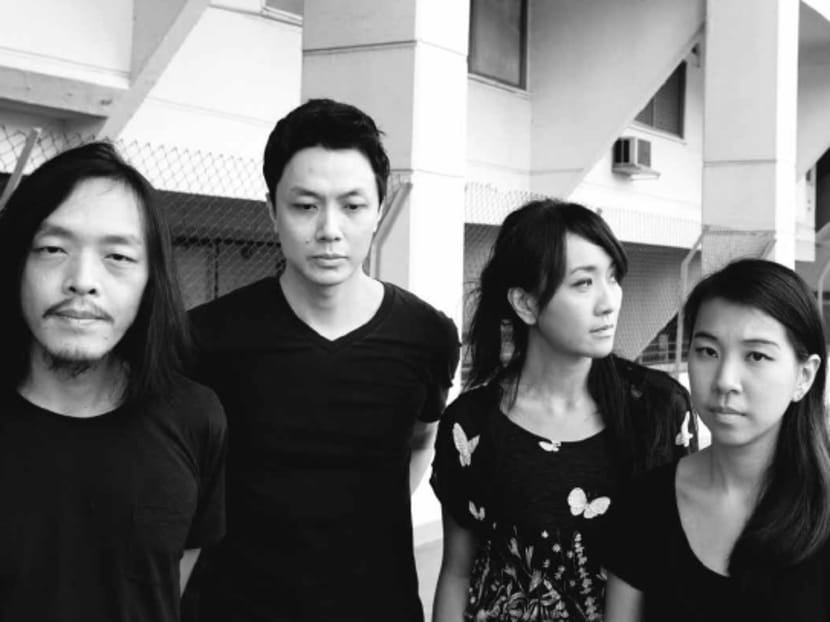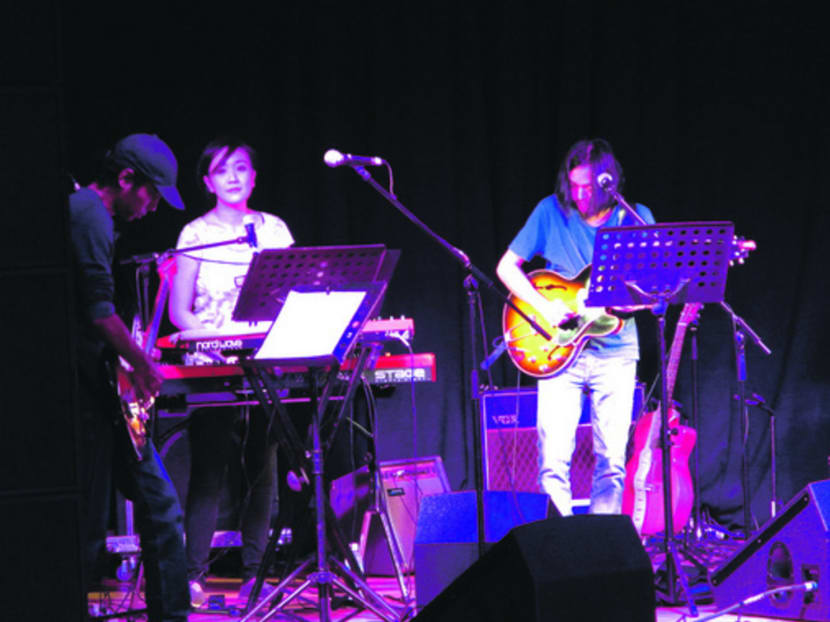S’pore band The Observatory takes time for reinvention
SINGAPORE — In the future, everyone will be world-famous for 15 minutes. So said pop art pioneer Andy Warhol. It was an exaggerated truth meant to convey the ephemeral nature of popularity and fame. In that context, it might be said that Singapore indie bands have even shorter shelf lives. So what do we make of The Observatory, formed in 2001 and by all accounts still going strong?


SINGAPORE — In the future, everyone will be world-famous for 15 minutes. So said pop art pioneer Andy Warhol. It was an exaggerated truth meant to convey the ephemeral nature of popularity and fame. In that context, it might be said that Singapore indie bands have even shorter shelf lives. So what do we make of The Observatory, formed in 2001 and by all accounts still going strong?
The band has just released its seventh album, Continuum, which they will perform at the Substation tonight. So why have The Observatory — now consisting of Leslie Low, Vivian Wang, Cheryl Ong and Yuen Chee Wai — lasted as long as they have?
Musician Victor Low, a former member of the band, offered an insider’s perspective. “The Observatory’s musical direction has always been in a constant flux, pushing the envelope in terms of sonic boundaries and often stepping out of comfort zones in terms of their music and approach,” he said. “Their dedication to pursue new projects is unwavering, be it an album, collaboration or an arts project, and that’s what drives them forward.”
Music enthusiast Tim Tan, who has been following the band since their first release, the Time Of Rebirth demo (2003), echoed that sentiment. “The Observatory has been able to constantly challenge themselves, evolve and surprise listeners with each new album while remaining melodic, honest and contemplative ... I think music lovers recognise and feel it when they hear it,” he opined. “Honesty endures and remains relevant. The Observatory have it.”
Others have mentioned the band’s experimental edge, although that is a descriptor that founding member Vivian Wang disagrees with. “It is experimental but it’s not inaccessible,” said Wang. To her, it’s too simplistic to think that most people would find it hard to appreciate their sound because for them, music serves an entertainment, feel-good function. “We try not to dumb down the masses and assume they can’t relate to our stuff. So often, I’ve seen people connect with a song simply based on vibe. They may not even understand the English lyrics but they feel the sentiment and can identify with what it’s about.”
So perhaps, as Wang insisted, music is so expansive and limitless that there really ought to be a way to enter into these musical experiences without obsessing over genres. Co-founding member Leslie Low confirmed this deliberate artistic intent to escape the confines of a genre-specific band.
“With each album, we intended to try something different. Never going back to what is familiar or comfortable,” Low explained. “It becomes what the music requires it to be as a result of the strengths of its contributing members. It was quite a jump from Dark Folke to Catacombs, for example.
“Those directions were developed before and during the process of composition,” said Low. “As of now, we’re still narrowing in on a direction for the next album. So it’s definitely not random.”
Ironically, the fact that The Observatory has seen several members pass through its ranks — Wang and Low are the only members who have been in the band since day one — has actually aided in the aforementioned process.
“Yes, we’ve had a revolving door of members since we began, but it’s not necessarily a bad thing,” Wang said. “When we became The Observatory, we agreed that this band isn’t a vehicle for self-aggrandising. It’s not our property. We wanted the idea of The Observatory to be a free space, for unfettered creative exploration, for reflecting and commenting on local issues, on life and anything to do with human existence.”
However, Wang took pains to dispel popular myths about the band’s creative process. “We don’t sit around in lotus position and meditate about achieving an artistic vision. Nor do we enjoy discussing artistic integrity,” she said. “It’s just not in our daily conversation, it feels so unnatural. We chat instead, about ‘those friggin amazing drum rolls in the latest Motorpsycho album’ or the ‘sound’ of the new Mark Kozelek album, laugh about adding cowbells to our sound or gush about music we’d been collectively obsessing over.”
Which brings us to Continuum, the album that was funded by the Arts Creation Fund and started when their line-up still included previous members Victor and Dharma. Multi-instrumentalist Bani Haykal was later added to the mix when Victor left the band. They worked on the project for a year, but it was never released after its completion in 2012.
The album features mostly instrumental songs, and incorporates, among others, gamelan instrumentation. “Leslie undertook all of the composition for the gamelan parts, the remaining three of us, Dharma, Bani and myself further added melodies, harmonic content and experimental sounds using mostly rock/electric instruments,” Wang explained.
For the live Substation performances, the band has invited other musicians to the complement. Joining The Observatory are four musicians from gamelan ensemble, BronzAge Gamelan, as well as former members Victor and Bani, along with bass player Irsyad Sidharta. “We also thought that it would be a good idea to get those who were involved in the process and recording of Continuum. We want to adhere as closely to the record as possible,” Ong explained.
For Yuen, who joined the band just before Dharma left, the band’s raison d’etre in which “culture is not a museum — it is ever changing” is a truism in more ways than one. “Culture is something that cannot and should not be gentrified,” he clarified. “We took it upon ourselves to create a piece of music that indeed uses the gamelan and intertwined it with modern musical instruments, to possibly open a new dimension to the use of the gamelan.
“South-east Asia is amazingly rich with culture. We just need to re-awaken and take notice of what actually belongs to us and make something good of it.”
What’s this? More reinvention and revolution for The Observatory? And why not? It will probably keep them in good stead for a long time to come.
For more details, visit http://www.theobservatory.com.sg.





